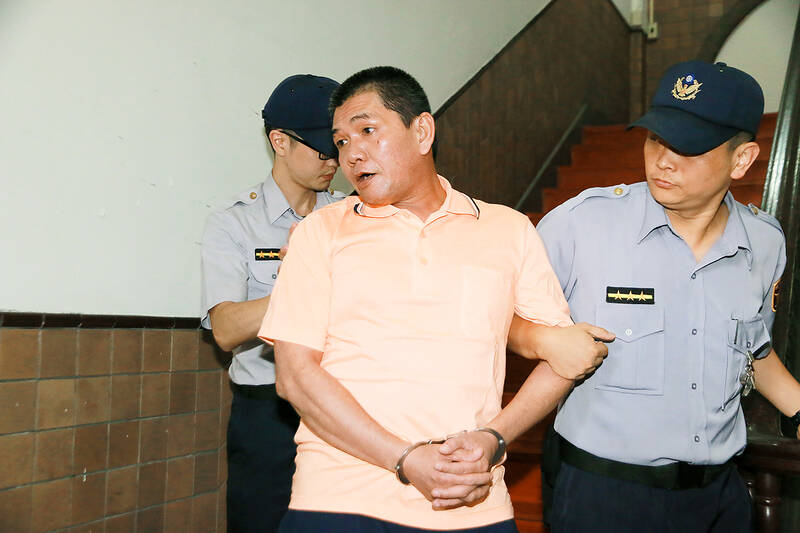The life imprisonment verdict handed down by the Taiwan High Court in the case of an ethnic Chinese man from Myanmar, who was initially sentenced to death for setting a fire in his rented residence that killed nine people, was upheld by the Supreme Court on Wednesday after it rejected an appeal by prosecutors.
Li Kuo-hui (李國輝), who said other tenants in the apartment building in New Taipei City’s Jhonghe District (中和) often taunted him, set the fire on the evening of Nov. 22, 2017, by pouring gasoline on the staircase on the fourth floor of the building and igniting it, after which he fled the scene.
The blaze engulfed the building’s fourth and fifth floors, and led to the deaths of nine tenants.

Photo: CNA
After being arrested, Li admitted committing arson, but denied his intent was to commit murder.
The New Taipei City District Court concluded in its ruling in 2018 that Li set the fire out of anger, causing the deaths of nine people, and sentenced him to death for murder.
The defendant appealed the ruling and saw it upheld by the Taiwan High Court three times — a first trial at the High Court and two retrials after it was sent back by the Supreme Court.
The verdict was upheld after it was determined Li had no mental disorders when he set the fire and was wanted by the police for two earlier counts of arson in May and June 2017.
However, the Supreme Court ordered a third retrial by the High Court, after determining that the High Court’s second retrial did not fully explain or examine Li’s motive or ability to defend himself during the trial.
In the case’s third retrial in December last year, the High Court concluded that Li set the building on fire with the intention of killing a tenant surnamed Chen (陳), who survived the blaze, and as such the killing of the other nine tenants was “indirectly intentional” and so could not be construed fully deliberate.
As a result, the third trial at the High Court downgraded Li’s crime and instead sentenced him to life imprisonment, while maintaining the life-long deprivation of his civil rights handed down by the district court.
Prosecutors appealed the ruling, but the Supreme Court upheld the High Court’s third retrial verdict and rejected the appeal on Wednesday, ending the case.

WANG RELEASED: A police investigation showed that an organized crime group allegedly taught their clients how to pretend to be sick during medical exams Actor Darren Wang (王大陸) and 11 others were released on bail yesterday, after being questioned for allegedly dodging compulsory military service or forging documents to help others avoid serving. Wang, 33, was catapulted into stardom for his role in the coming-of-age film Our Times (我的少女時代). Lately, he has been focusing on developing his entertainment career in China. The New Taipei District Prosecutors’ Office last month began investigating an organized crime group that is allegedly helping men dodge compulsory military service using falsified documents. Police in New Taipei City Yonghe Precinct at the end of last month arrested the main suspect,

A cat named Mikan (蜜柑) has brought in revenue of more than NT$10 million (US$305,390) for the Kaohsiung MRT last year. Mikan, born on April 4, 2020, was a stray cat before being adopted by personnel of Kaohsiung MRT’s Ciaotou Sugar Refinery Station. Mikan was named after a Japanese term for mandarin orange due to his color and because he looks like an orange when curled up. He was named “station master” of Ciaotou Sugar Refinery Station in September 2020, and has since become famous. With Kaohsiung MRT’s branding, along with the release of a set of cultural and creative products, station master Mikan

RISING TOURISM: A survey showed that tourist visits increased by 35 percent last year, while newly created attractions contributed almost half of the growth Changhua County’s Lukang Old Street (鹿港老街) and its surrounding historical area clinched first place among Taiwan’s most successful tourist attractions last year, while no location in eastern Taiwan achieved a spot in the top 20 list, the Tourism Administration said. The listing was created by the Tourism Administration’s Forward-looking Tourism Policy Research office. Last year, the Lukang Old Street and its surrounding area had 17.3 million visitors, more than the 16 million visitors for the Wenhua Road Night Market (文化路夜市) in Chiayi City and 14.5 million visitors at Tainan’s Anping (安平) historical area, it said. The Taipei 101 skyscraper and its environs —

Taiwan on Friday said a New Zealand hamburger restaurant has apologized for a racist remark to a Taiwanese customer after reports that it had first apologized to China sparked outrage in Taiwan. An image posted on Threads by a Taiwanese who ate at Fergburger in Queenstown showed that their receipt dated Sunday last week included the words “Ching Chang,” a racial slur. The Chinese Consulate-General in Christchurch in a statement on Thursday said it had received and accepted an apology from the restaurant over the incident. The comment triggered an online furor among Taiwanese who saw it as an insult to the